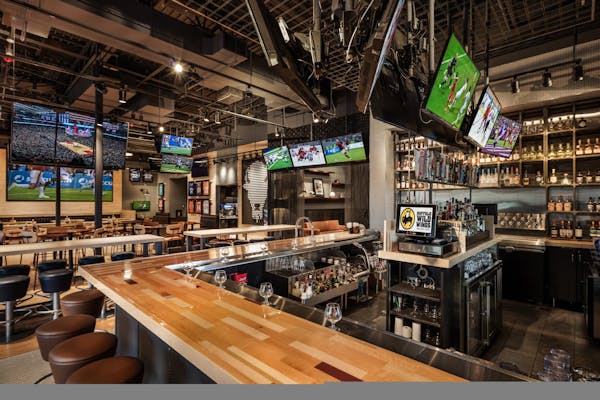NORTHWOOD, IOWA – The Vikings game was a snoozer, but the Minnesotans watching the big screens at Diamond Jo Casino were still cheering loudly Sunday long after the outcome of the Raiders game seemed certain.
Why the extra enthusiasm?
They bet on the Vikings, but it wasn't enough for the purple guys just to win. They had to win by more than 8½ points to beat the spread, and the final score was 34-14.
"Anything for our constituents," joked Rep. Pat Garofalo, R-Farmington. He had led the delegation of three dozen Minnesota lawmakers, legislative staff, lobbyists and curious gawkers. Each paid $20 to take a bus here Sunday so they could get a closer look at a sports betting operation that opened last month after the Iowa Legislature legalized it in May.
The trip was Garofalo's latest move to champion legalizing sports betting in Minnesota, an idea that faces heavy odds in the face of significant opposition from his own party as well as indifference among the DFL leaders who control the House.
"Iowa is well positioned due to Minnesota's lack of action. And you're going to see a steady increase in Minnesotans choosing to spend their entertainment dollars in Iowa as opposed to Minnesota," said Garofalo, whose Twitter feed is filled with arcane sports betting jargon and commentary.
During the opening 17 days of legal sports betting in Iowa, sportsbooks took in a bit more than $8.5 million, shelled out a bit more than $2.1 million in winnings and paid $146,000 in taxes, according to a report of the Iowa Racing and Gaming Commission.
The parking lot of the casino just over the Iowa border — about 75 minutes from the south metro — was filled with Minnesota plates Sunday, as it has been every Sunday since football season started, casino workers said.
Amid the cacophonous bleep-bloop-blots of the slot machines and the odoriferous cocktail of tobacco and heavily perfumed air, Vikings jerseys were popular among the customers waiting at sports betting kiosks resembling ATMs. The sportsbook is managed by FanDuel, the daily fantasy sports company well known to fans after millions spent marketing.
This is not the little betting card your ne'er-do-well-uncle got from a shady guy at the back of a local bar.
On the machines, customers could make more than a dozen bets on a single NFL game, of which there were more than a dozen on Sunday alone. In addition to the usual bets on who would win and by how much, they could also wager on a dozen or more "prop" bets on everything from the amount of total points scored to how many touchdown passes Kirk Cousins would throw.
At the same time, the playoff-hungry Twins were their own source of betting intrigue.
Opponents of legal sports betting say if Minnesotans want to bet on their often heartbreaking pro sports teams, let them make the journey to Iowa.
"My concern is accessibility," said Rep. Josh Heintzeman, R-Nisswa. "It's one more challenge families face," he said, referring to various temptations faced by young men in particular.
Academic research suggests 2.2% of adults exhibit characteristics of "problem gambling," while 2.1% of adolescents are classified as having a gambling problem and another 6.5% meet two to four different criteria for pathological gambling, according to the National Council on Problem Gambling.
For now, opponents like Heintzeman retain the upper hand, largely due to the influence of tribal interests that currently control much of the state's gambling industry.
Both the DFL House majority and the Senate Republicans have other priorities for the legislative session that begins in February — in an election year in which all 201 legislative seats will be on the ballot.
Republican lobbyist Brian McDaniel, whose firm Franzen-Moore represents the Running Aces Casino & Racetrack in Columbus, took the trip with Garofalo and bet against the Packers — naturally — and for his beloved Chicago Cubs. He compared legal sports betting to Sunday liquor sales: that issue was a winner in public-opinion surveys but nevertheless took years to pass the Legislature in the face of entrenched opposition.
"Like marijuana, it's gonna happen. It's just a matter of when," he said, referring to another controversial issue that may take years to resolve.
State Sen. Karla Bigham, DFL-Cottage Grove, is a lifelong Minnesota sports fan and Senate co-author of sports betting legislation along with the chairman of the Taxes Committee, Sen. Roger Chamberlain, R-Lino Lakes.
She bet on the Vikings, Chiefs, Patriots and 49ers — but just low stakes.
"Because I'm fiscally conservative," she said. "Why are you laughing?" she replied when a Republican operative snickered.
"We're one of the few states with a professional team in every league, and it feels like we're not moving forward with something that would be a natural fit," Bigham said.
Waiting for the bus home, Rep. Jon Koznick, R-Lakeville, joked that despite the Iowa trip, he wanted to assure his constituents that he had been to 7:30 a.m. mass on Sunday. He's still on the fence about bringing legal sports betting to Minnesota.
One thing is for sure: He must not have statewide political ambitions because he volunteered that he bet against the Vikings.
He lost.

Want to share info with the Star Tribune? How to do it securely

'Safe recovery sites' would offer syringes, naloxone and more to people using drugs. The plan could be in peril.
New Minnesota GOP leaders seek peace with party's anti-establishment wing

Who is Republican Lisa Demuth, Minnesota's first House speaker of color?

